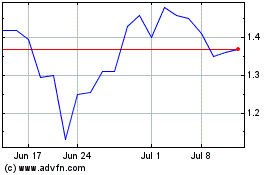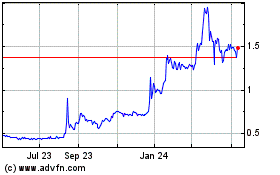Lloyds Probe Opens New Front in Government Scrutiny of Markets
January 07 2016 - 2:40AM
Dow Jones News
Broad government scrutiny of possible market rigging has
deepened with a probe by the U.K.'s financial watchdog into trading
of British government bonds by Lloyds Banking Group PLC, according
to people familiar with the matter.
The Financial Conduct Authority's inquiry, which is at an early
stage, is examining whether Lloyds traders sought to increase their
profits, either by driving down the prices that the British bonds,
known as gilts, fetched in government auctions, or by artificially
inflating their prices when the bonds were sold on to other
investors, one person said.
The investigation is currently focused on individual traders at
Lloyds and isn't a broader industrywide probe into the massive gilt
market, one person said. Lloyds in recent months has been handing
over information to the FCA, and some of its traders have retained
outside lawyers, the people said.
The probe is yet another front opening in government
investigations into the manipulation of crucial markets. Since
2012, authorities in the U.S., Britain and elsewhere have levied
more than $10 billion in penalties on some of the world's biggest
banks for trying to rig widely used interest-rate and
foreign-exchange benchmarks. As a result of those cases, those
banks have been obligated to turn over to prosecutors any evidence
of additional wrongdoing, spurring further probes.
Now, markets ranging from U.S. Treasurys to debt issued by
global quasigovernmental agencies have drawn attention from
law-enforcement authorities. And while major banks have settled
currency probes focused on trading between euros and U.S. dollars,
the Justice Department still is looking at individuals involved in
some of those cases, and could bring charges later this year, some
of the people said. Other probes are focused on possible
manipulation of other currencies, such as the Russian ruble and the
Brazilian real.
Taken together, the continuing investigations suggest banks will
remain in the cross hairs of prosecutors and regulators for many
months with the potential for new, sizable penalties. They also
appear to indicate that problems that at first appeared limited to
a handful of markets may be more widespread than that.
One active investigation centers around debt issued by
subsovereigns, supranationals and agencies, or SSAs, which is
currently worth $2.4 trillion in outstanding instruments, according
to Barclays' bond indices.
The U.S. Justice Department and other regulators are looking at
whether traders at different institutions colluded to set prices in
those markets, according to people familiar with the matter. The
FCA has been assisting the Justice Department in that
investigation, which focuses in large part on London-based traders,
some of the people said.
Companies including Bank of America Corp's Merrill Lynch and
Nomura Holdings Inc. recently have suspended London-based traders
in connection with the Justice Department's investigation in the
market for SSA bonds, according to regulatory records and people
familiar with the matter. Reuters earlier reported the suspensions,
and said traders at Credit Suisse and Cré dit Agricole are also
under investigation.
This group of SSA borrowers includes the World Bank and the
European Investment Bank, which raise billions of dollars every
year to invest in development projects. In the U.S., such issuers
include mortgage-finance giants Fannie Mae and Freddie Mac.
As previously reported by The Wall Street Journal, the market
for trading in U.S. government debt also has come under scrutiny by
the Justice Department and regulators. A number of banks have been
turning over information as authorities, including the Securities
and Exchange Commission and the Commodity Futures Trading
Commission, seek evidence of possible manipulation.
Previous investigations were aided by strong evidence of traders
openly discussing their efforts in Bloomberg chat rooms. Some of
the continuing probes, including the further currency
investigations, so far haven't unearthed as much strong evidence,
people familiar with the matter said. Government and internal bank
investigators in the inquiries are examining recordings of phone
calls between traders for similar evidence, which is a more
time-consuming process, the people said.
In some of the cases, U.S. prosecutors still are trying to
determine whether there is a strong U.S. connection to justify
bringing a case, including whether harmed customers were based in
the country, since much of the trading occurred overseas.
The SSA bond investigation and the continuing foreign-currency
probes are similar to earlier cases in the interest-rate-benchmark
and currency markets, which invoked antitrust theories that
multiple banks had colluded to set prices. But the Treasurys
manipulation probe, being handled by the Fraud Section at the
Justice Department, is focused on whether traders at individual
banks used customer information to trade ahead of them, people
familiar with the probes said.
Write to David Enrich at david.enrich@wsj.com, Aruna Viswanatha
at Aruna.Viswanatha@wsj.com and Christopher Whittall at
christopher.whittall@wsj.com
(END) Dow Jones Newswires
January 07, 2016 02:25 ET (07:25 GMT)
Copyright (c) 2016 Dow Jones & Company, Inc.
Fannie Mae (QB) (USOTC:FNMA)
Historical Stock Chart
From Mar 2024 to Apr 2024

Fannie Mae (QB) (USOTC:FNMA)
Historical Stock Chart
From Apr 2023 to Apr 2024
